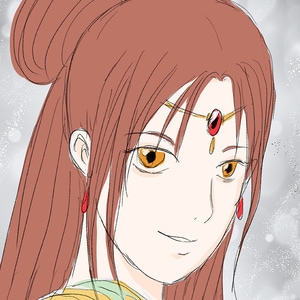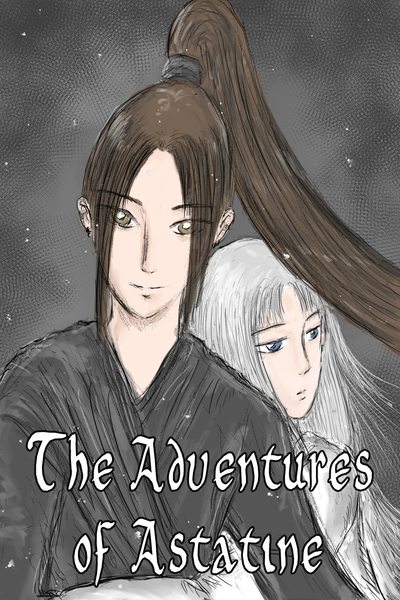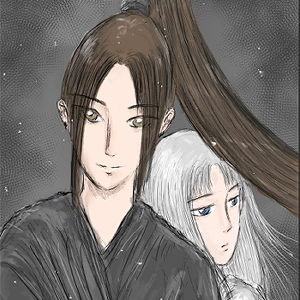“I grew up in a small village in the mountains,” Eskil said. “It’s interesting that you say you’ve never seen anyone with silver hair before because everyone in our village had silver hair. We were a tight-knit community. Although everyone had their own families, children were raised by the whole village. Everyone started learning magic when they were young. Most of the villagers could perform basic healing magic by the time they were ten. Well, except for me…”
Astatine raised his eyebrow. “Was there any reason you couldn’t?”
“I’m just a late bloomer, I suppose,” Eskil said. “But people said it was because of my parents.”
“What do you mean?”
“Only my mother was from the village. My father was from the outside. I’ve only heard a little bit of his story, but years before I was born, he wandered into our village. His clothes were tattered and his boots were falling apart. At first the villagers wanted to kick him out, since they don't really trust outsiders. But he also looked very ill, and since we’re all healers, it was against our values to turn away a person in need. So they put him in an empty cottage and healed his injuries. They also gave him new clothes to wear, but were shocked when they could see his ribs through his skin when he changed out of his old shirt.”
Astatine winced. “That bad, huh?”
“Yeah. He had been eating so little for so long that he was wasting away. My mother was one of the people who brought him food while he recovered. It was hard for him to eat much at first. One time he couldn’t even keep the food in and threw it back up. When my mother came back with a pail of water and rags, he made a lot of gestures and started cleaning it up himself, even though he was still very weak. My mother guessed that he didn’t want to be too much of a burden to the villagers. Or maybe he didn’t want to be a burden for her.”
“How old were your parents at the time?”
“Ah, I don’t know. Maybe a couple years younger than I am now.”
“How old are you?”
“I’m…” Eskil looked upward for a moment. “Sorry, I’ve been in the wilderness for so long that I lost track of the years. I’m twenty-three, I think.”
“Huh. That makes you only about two years younger than me.”
“Oh really? I thought you were older.”
“Haha. Am I supposed to feel flattered or insulted?”
Eskil’s face flushed.
“Sorry, go on. You were talking about your parents. How did they end up together, if it’s okay to ask that?”
“It’s fine. My mother told me that it took him a while to recover and eat normally again. She started bringing him different things to eat, so it wasn’t the same porridge every single day. He ate everything she brought him, so she figured he was just happy to have food. Nevertheless, she thought it was important to give him some variety. And one day, when she came to collect his bowl, he gave her a little figurine that he made out of straw. There was a lot of straw in the cottage, so he probably got it from there. It was a simple gift, but she appreciated it.”
“Did they ever find out where he was from?”
“Eventually. He couldn’t speak our language at first, but after a while, he picked up some words. And he’d start using those words to communicate with the other villagers. My mother said it was hard for him at first, since he could only speak like a child. But he wanted to help out in the village to give his thanks, so they assigned him simple tasks. The more he interacted with the other villagers, the more he learned our language. Eventually he was able to tell my mother where he came from.
He said he was from the east and was escaping a war. His own village was on the edge of a forest, and when soldiers invaded, he fled into the wilderness and headed westward. He was on his own for a while and survived by foraging and hunting small animals. Winters were especially hard. If he hadn’t sheltered in caves that he found, he probably wouldn’t have made it.”
Astatine mulled over Eskil’s words. “You said he was escaping a war…”
“Yeah, I don’t know that many details about it.”
“How…how did you learn to speak in Sargeshi?”
Eskil looked at him. “What’s that?”
“That’s the language you’re speaking right now. Did the people in your village speak it?”
“No, our language was completely different.”
“Who taught you Sargeshi? Did you pick it up while you were traveling here?”
“Some, but I knew a little already. My father taught me some when I was younger. Basic words and phrases. He liked languages and thought he should pass on his knowledge to me, even though he didn’t think I’d ever need it since he assumed we’d just stay in our village for the rest of our life.”
Astatine’s eyes widened.
“Something wrong?”
“Sargeshi is the language spoken in the Four Regions here. Every region has their own language and dialects, but Sargeshi is taught as a second language so that people from different regions can communicate with each other. Which means…”
Eskil looked up at him, trying to figure out what he was implying.
“Your father is from here.”
“What do you mean ‘here’?”
“He’s from one of the Four Regions. Maybe even the Western Region, if you said he was living at the edge of a forest and journeyed through the wilderness before finding your village.” And if he was escaping a war that occurred more than twenty-three years ago…
Astatine did not know much about the history of the other regions since he spent his entire life in the Southern Region. However, Samarian had told him that before King Xenon ordered the invasion of the Southern Region, he had been unifying the smaller kingdoms of the Western Region, and not by entirely peaceful means. He began to feel a gnawing pit in his stomach.
“My father is from here? Wow, so I ended up making the journey in reverse. And for the same reason.”
Astatine raised an eyebrow. “What do you mean, the same reason?”
Eskil looked downward. “That’s what I wanted to tell you about. When I was eighteen, my village was invaded.”
Astatine’s eyes widened. “By who?”
“Our village was in the mountains, and there was a king who ruled over the lowland territories. Over the years, his envoys came to our village and made offers of an alliance. They promised to give us more food and build roads in the mountains to open up trade between our village and the rest of the kingdom. In return, we would pledge our allegiance to the king and become his loyal subjects. They said that the alliance would benefit us and make our village wealthier. Our village elders always refused though. They would tell the envoys that we preferred to be free from outside rule, even if it meant living a simpler life. They said that we may have been poorer than the cities in the lowlands, but we were happy the way we were.”
Astatine looked at him solemnly. He remembered his own village in the valley where he was born. He remembered how happy he was then too.
”After the envoys’ last visit, our village elders and other adults discussed their offers. They weren’t entirely in agreement with each other either. Some of the adults thought it might not be a bad idea to open ourselves up to trade, since our small village did not produce many things. We had small farms and raised animals to survive. Most of the time we were fine, but if we had a smaller harvest one year, we had to ration food and hunt more to get through the winter. I was younger at the time, and I didn’t think there was anything wrong with letting the king’s people build roads to our village. I was curious about life on the outside.
However, the elders were insistent that we remain closed to the outside world. I thought maybe they were just old and didn’t want change. I asked my parents why the elders were refusing the envoys’ offers, since it sounded like it would be good for our village. My mother said the situation wasn’t that simple and that the elders had their reasons. My father, although he didn’t grow up in our village, simply said ‘Don’t trust people that make such generous promises. They’re going to expect something in return.’ I knew that he had escaped his own village being invaded, so I figured that was why he was so cynical.”
Astatine frowned. He remembered when Eskil had been skeptical of his generosity. It was starting to make more sense now.
“I asked my mother what the king’s people would have wanted from us in return since we were such a small village. She said that they probably wanted our abilities. When I asked her to explain further, she said she grew up listening to stories about our community’s past. Besides healing magic, some of our people also possessed lightning magic abilities and could tame dragons. These were rare gifts, and those in power wanted to have people like that under their command. It was for that reason that our people hid in the mountains, far away from the rest of the world. They did not want to be used as tools for other people’s ambitions.”
“I see,” Astatine said solemnly. He then raised his eyebrows. “Wait, did you say that your village raised dragons?”
“We didn’t raise them. Dragons are wild creatures, and usually uncontrollable by others. But some people in our village had the ability to bond with them. It’s like…if your horse was raised in the wild and you were able to form a mental connection with it and gain its loyalty.”
“Oh…interesting. Is that why you were so intent on waiting for the dragon’s egg to hatch?”
Eskil looked at him sadly. “Yes…I wanted that to be my dragon.”
“Where did you find the egg?”
“Dragons make their nests in caves. I was exploring the caves around our village and I found a dragon’s nest in one of them. It was just a pile of dried grass and twigs with a single egg in the middle. There was no sign of the dragon mother, even after I visited the cave again in the days after I first found it. I wondered if something had happened to her while she was out flying around.
One day, after visiting the cave, I returned home to get my lute because I was going to meet up with some friends to play music. My parents were elsewhere in the village at the time, and I figured I’d meet them later for dinner. As soon as I strapped the lute to my back, I smelled smoke and heard people screaming. I ran outside and saw soldiers on horseback setting fire to all our buildings.”
Astatine felt a terrible sinking feeling in his chest. His limbs felt cold, as if someone had plunged them in an icy river.
“Some of the villagers were using their lightning magic to fight off the soldiers. But the soldiers came prepared. They had special shields that protected them from the lightning and weapons that struck down our people with a single blast. I’d never seen anything like that before. I was so scared. I ran around the village looking for my parents. I found my mother in the chaos. She said my father had been killed by the soldiers’ weapons. We ran together toward the edge of the village and were stopped by another group of soldiers. As they were about to attack us, my mother summoned her lightning magic to distract them. I’ll never forget the last words she said to me.
‘Run! Don’t stop and don’t turn around, no matter what you hear! Just keep running!’
So I ran. I went up the mountain until I found myself near the cave where I found the abandoned dragon’s egg. I thought maybe I could hide there, but then decided that it was still too close to the village and that the soldiers might find me. But I also didn’t want to leave the egg there, so I grabbed it, stuffed it into my bag, and kept running. I just kept running and running until I could no longer smell the smoke from the village or hear the awful sounds of destruction. I didn’t know where I was, but I just kept going…”
At this point, Eskil had to stop. Tears were forming in his eyes. They spilled down his cheeks and he began to tremble.
“Eskil…” Astatine murmured. He wrapped his arms around Eskil. Eskil buried his face in Astatine’s chest and began to sob. “I’m so sorry that happened…”
Eskil tried to speak between shaky breaths. “I was alone for so long…”
Astatine held him closer. “It’s okay…I’m here for you…”











Comments (0)
See all